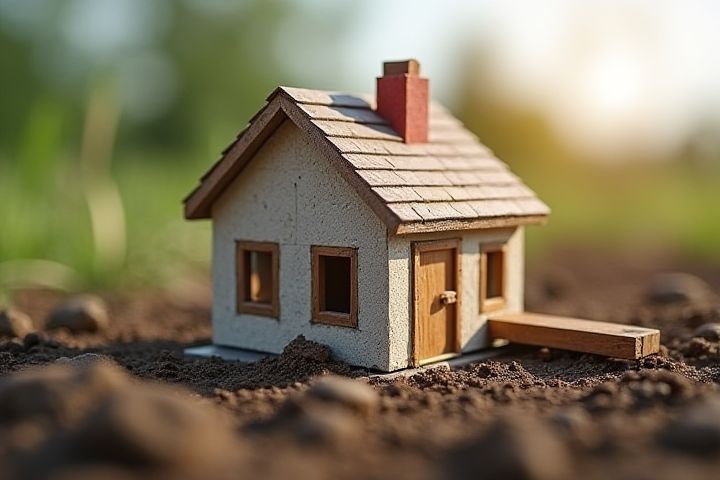
A house requires a foundation to ensure structural stability and longevity. The foundation distributes the weight of the building evenly across the ground, preventing settling or shifting. There are various types of foundations, including slab, crawl space, and basement, each suited for different soil conditions and climates. In regions prone to natural disasters, such as floods or earthquakes, a properly designed foundation becomes even more critical for safety. Without a solid foundation, your home risks severe structural damage over time, leading to costly repairs and safety hazards.
Does A House Need A Foundation
Structural Support
A house requires a foundation to ensure structural support, distributing the weight of the building evenly across the ground. Without a proper foundation, issues such as settling, cracking, and instability can arise, potentially leading to significant repair costs that may exceed $30,000. Foundations also play a crucial role in protecting against moisture, helping to prevent mold growth and structural damage. In regions with frost, a depth of at least 42 inches is often necessary for foundations to prevent heaving during freeze-thaw cycles, highlighting the importance of tailored planning for your home's location.
Soil Stability
A house requires a solid foundation to ensure its structural integrity and longevity, which is significantly influenced by soil stability. The foundation must be designed to accommodate the type of soil present, whether it's clay, sandy, or rocky, each presenting unique challenges. Poor soil stability can lead to uneven settling, cracks in walls, and potentially catastrophic structural failures. Conducting a soil analysis before construction can help determine the appropriate foundation type, ensuring your home remains safe and secure over time.
Moisture Prevention
A strong foundation is crucial for preventing moisture issues in your home, with concrete being the most common material used. Proper drainage systems, such as gutters and downspouts, should direct water away from the foundation, minimizing the risk of water damage. According to the Environmental Protection Agency (EPA), maintaining a moisture level below 60% in your basement can prevent mold growth and improve indoor air quality. Ensuring proper grading around your foundation helps facilitate water flow away from your house, protecting your investment and enhancing durability.
Insulation
A house requires a solid foundation to ensure stability and longevity, but properly installed insulation is critical for energy efficiency. According to the U.S. Department of Energy, roughly 30% of heating and cooling energy is lost through poorly insulated areas. Effective insulation can reduce your energy bills by up to 15%, making it a vital component in maintaining indoor comfort. For optimal performance, consider using materials like spray foam or fiberglass, which can significantly improve thermal resistance.
Load Distribution
A house requires a foundation to effectively distribute the load of the structure to the ground, ensuring stability and preventing structural failure. Typically, foundations can vary in type, with options like slab, crawl space, and basement foundations, each designed for specific load-bearing needs. For instance, a concrete slab foundation supports the weight of the house directly on the ground, whereas a basement foundation provides elevation and additional support. Proper load distribution through a well-constructed foundation can enhance the lifespan of your home, protecting it from settling and other structural issues over time.
Building Regulations
A house typically requires a foundation to meet Building Regulations, which dictate structural integrity and safety standards. According to UK Building Regulations, all new buildings, including houses, must be constructed on a foundation that is designed to support the load and prevent settlement issues. The depth and type of foundation can vary based on soil type, local climate, and the design of the building, usually ranging from 0.5 to 2.5 meters deep. Ensuring compliance with these regulations helps to avoid costly repairs and maintain the safety and longevity of your home.
Durability
A house requires a solid foundation for optimal durability, as it supports the entire structure and helps distribute weight evenly. Typically, concrete is used for foundations due to its strength and longevity, with an average lifespan of over 50 years when properly maintained. A well-built foundation prevents issues such as water damage, mold growth, and structural instability, which can significantly reduce the lifespan of a home. Investing in a quality foundation can enhance your property's overall resilience against climate events and soil shifting, ultimately safeguarding your investment.
Resale Value
A sturdy foundation significantly enhances a house's resale value, often accounting for 10-15% of its total worth. Homes with slab, crawl space, or full basement foundations typically attract more buyers due to their perceived structural integrity and lower risk of foundation-related issues. Properties lacking a proper foundation may struggle to secure offers, potentially decreasing market interest and sale price. Ensuring your home has a reliable foundation can make it more appealing in a competitive real estate market.
Safety Concerns
A house requires a sturdy foundation to ensure structural integrity and safety, as it evenly distributes weight and prevents settling or shifting over time. Without a proper foundation, homes may experience cracks in walls, uneven floors, and ultimately compromised safety for occupants. Additionally, a well-constructed foundation safeguards against environmental factors such as moisture, pests, and extreme weather, which can lead to costly repairs and hazardous living conditions. Prioritizing a solid foundation during construction can significantly enhance the longevity and stability of your home.
Energy Efficiency
A house requires a proper foundation to ensure structural integrity and energy efficiency, as it directly impacts insulation and thermal performance. A well-designed foundation can prevent heat loss, reducing energy consumption by up to 15% in many climates. Utilizing materials with high thermal mass, like concrete, enhances energy savings by maintaining stable indoor temperatures. Investing in energy-efficient technologies during foundation construction significantly contributes to lower utility bills and a reduced environmental footprint over time.
